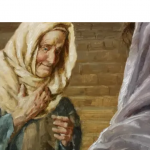Notes used to present a Zoom lesson during the summer of 2020.
Have you ever been perplexed over what a passage in the Bible is talking about? Sometimes this can be as simple as a word or phrase or it can be the entire passage. Sometimes it is something people have grappled with for years. Sometimes I feel as if I am the only one who does not get it. Peter understood this and even called Paul out as one who wrote difficult things to understand.
2 Peter 3:15-16
“….just as also our beloved brother Paul, according to the wisdom given him, wrote to you, as also in all his letters, speaking in them of these things, in which are some things hard to understand, which the untaught and unstable distort, as they do also the rest of the Scriptures, to their own destruction.”
Here are three of those confusing Bible passages that I have discussed recently with Danny. I think I now have a handle on their meaning but am always up for another’s point of view.
What exactly is the gift of the Holy Spirit?
Acts 2:38
Then Peter said to them, “Repent, and let every one of you be baptized in the name of Jesus Christ for the remission of sins; and you shall receive the gift of the Holy Spirit. For the promise is to you and to your children, and to all who are afar off, as many as the Lord our God will call.”
This is a verse we have all known from the time we were small or the time we first learned the gospel. “Repent” is easy. “Be baptized” is easy. While some will argue over the meaning of “remission of sins”, I find it easy to understand. What I have always had trouble understanding and explaining to others is “the gift of the Holy Spirit”.
- What is this gift?
- What do you think of when you read this?
In times past, I have thought it was a spiritual gift like speaking in tongues or doing miracles, but I knew that I never received any such thing when I was baptized. Since this promise was to all who would come after, I should receive the same thing the people in Acts 2 received.
Acts 8 gives us another example of conversions. These converts did not receive spiritual gifts at their baptism.
Acts 8:14-17
Now when the apostles in Jerusalem heard that Samaria had received the word of God, they sent them Peter and John, who came down and prayed for them that they might receive the Holy Spirit. For He had not yet fallen upon any of them; they had simply been baptized in the name of the Lord Jesus. Then they (Peter and John) began laying their hands on them, and they were receiving the Holy Spirit. Now when Simon saw that the Spirit was bestowed through the laying on of the apostles’ hands, he offered them money, saying, “Give this authority to me as well, so that everyone on whom I lay my hands may receive the Holy Spirit.”
These people in Samaria were baptized but had not received the Holy Spirit. They only received the Holy Spirit when Peter laid his hands on them. They had already baptized as commanded in Acts 2 so they must have received the gift of the Holy Spirit at that time, so receiving the gift of the Holy Spirit and receiving the Holy Spirit must be two different things. These people received what was promised in Acts 2 but did not have any miraculous gifts. They were still saved, still Christians. It took the laying on of the apostles’ hands to receive any miraculous gifts like healing, speaking in tongues, etc.
Those who received the Holy Spirit only did so when the apostles laid their hands on them. This was the spiritual gifts described in 1 Corinthians 12-13 — miracles, prophecy, tongues, knowledge, etc. Things not necessary to being a Christian but necessary during this time when the Word was being revealed to prove its reliability and increase its spread throughout the world.
Acts 3 shares a sermon that is similar to the one in Acts 2. It teaches the same thing as Acts 2:38 but uses different words. Words that should help us better understand the meaning in Acts 2.
Acts 3:19
Repent therefore and be converted, that your sins may be blotted out, so that times of refreshing may come from the presence of the Lord.
Consider Acts 3:19 parallel to Acts 2:38
| Acts 2:38 | Acts 3:19 |
| Repent | Repent |
| Be Baptized | Be Converted |
| For the remission of sins | That your sins may be blotted out |
| You shall receive the gift of the holy spirit |
Times of refreshing may come from the presence of the Lord. |
Gift of the holy spirit = times of refreshing
My conclusion?
The “gift of the Holy Spirit” is salvation that is obtained upon repentance and baptism while receiving the Holy Spirit would be spiritual gifts only received through the laying on of the apostles’ hands.
What is the oil that the elders were to anoint the sick with?
James 5:14-15
Is anyone among you sick? Let him call for the elders of the church, and let them pray over him, anointing him with oil in the name of the Lord. And the prayer of faith will save the sick, and the Lord will raise him up. And if he has committed sins, he will be forgiven.
Is this some sort of healing oil?
Why don’t our elders rush to the bedside of our sick and pour oil on them?
- Some say this is a healing oil traditionally used during this time to heal the physically sick.
- Some say it is a symbolic oil used to represent God’s healing power through the faith of the righteous elders.
- Some say the person has an actual physical sickness.
- Some say the person is a weak brother and the anointing is the faithful prayer. (The inclusion of forgiveness of sins in verse 15 supports this idea).
From David Pratte’s La Vista Church of Christ website: “Astheneo” translated “sick” in James is translated “weak” in Romans 14:21 (NKJV)
Romans 14:21
“It is good neither to eat meat nor drink wine nor do anything by which your brother stumbles or is offended or is made weak.”
The elders would be the logical ones to call in this situation. They, being righteous and well-grounded in God’s word, would be able to encourage the weak brother with God’s Word and prayer which in Psalm 107:20 says can heal.
Psalm 107:17-22
Fools, because of their transgression, And because of their iniquities, were afflicted. Their soul abhorred all manner of food,
And they drew near to the gates of death. Then they cried out to the Lord in their trouble, And He saved them out of their distresses. He sent His word and healed them, And delivered them from their destructions. Oh, that men would give thanks to the Lord for His goodness, And for His wonderful works to the children of men! Let them sacrifice the sacrifices of thanksgiving, And declare His works with rejoicing.
This also explains the connection to the following verses:
James 5:15-16
“And the prayer of faith will save the sick, and the Lord will raise him up. And if he has committed sins, he will be forgiven. Confess your trespasses to one another, and pray for one another, that you may be healed. The effective, fervent prayer of a righteous man avails much”
My Conclusion?
- The sick is sick spiritually — not an outward physical sickness.
- The elders are the righteous men. Vs 16
- The prayer of the elders is the anointing oil. (it does not say pray and anoint. It says pray, anointing… In the same sense we might say “I am studying, learning your history”.
- The healing is forgiveness of sins and strengthening the weak.
What does 1 Corinthians 3:14-15 mean?
1 Corinthians 3:5-15
Who then is Paul, and who is Apollos, but ministers through whom you believed, as the Lord gave to each one? I planted, Apollos watered, but God gave the increase. So then neither he who plants is anything, nor he who waters, but God who gives the increase. Now he who plants and he who waters are one, and each one will receive his own reward according to his own labor.
For we are God’s fellow workers; you are God’s field; you are God’s building. According to the grace of God which was given to me, as a wise master builder I have laid the foundation, and another builds on it. But let each one take heed how he builds on it. For no other foundation can anyone lay than that which is laid, which is Jesus Christ. Now if anyone builds on this foundation with gold, silver, precious stones, wood, hay, straw, each one’s work will become clear; for the Day will declare it, because it will be revealed by fire; and the fire will test each one’s work, of what sort it is. If anyone’s work which he has built on it endures, he will receive a reward. If anyone’s work is burned, he will suffer loss; but he himself will be saved, yet so as through fire
In the past I have failed to look at this passage as a whole. I have read verses 12-15 and been perplexed. I took “ANYONE” to mean ME. How can my work, that has been burned, cause me to both suffer loss and be saved? Looking at it as my life’s work, the deeds I do from day to day, does not take into account the previous verses.
- The Corinthians had preacheritis, following their favorite preacher.
- Paul and Apollos were servants (ministers) God used to help them believe. Each doing their part.
- Each one who teaches another will receive a reward based on their work.
This passage is talking about preachers and teachers.
- Paul and Apollos are God’s workers.
- Those they teach are God’s building / each one a part of the building.
- Paul laid the foundation (taught them first about Christ).
- Apollos and others added to that teaching.
- One day those who make up the building will be tested (the genuineness of their faith according to 1Peter 1:6-7. Those who survive are those who are pleasing to God. Those who are burned are those who do not please God.
- The preachers/teachers will be rewarded for their solid teaching.
My Conclusion?
Paul is speaking as a preacher about himself and those who follow in his footsteps. He will teach many. Some will believe and follow Christ. Some will not. Some will be successful in their walk as a Christian. Some will barely get by and in the end, burn up under the pressure/temptation being a Christian involves.
The teacher will be rewarded for his work. The teacher will be discouraged (suffer loss) over those who are not strong enough to endure but it will not affect his salvation.
1 Timothy 4:16
Take heed to yourself and to the doctrine. Continue in them, for in doing this you will save both yourself and those who hear you.
James 5:19-20
Brethren, if anyone among you wanders from the truth, and someone turns him back, let him know that he who turns a sinner from the error of his way will save a soul from death and cover a multitude of sins.








None of these verses are especially confusing to anyone with an elementary reading level.
Peace be with you, go with Christ.